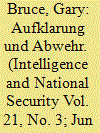| Srl | Item |
| 1 |
ID:
075300


|
|
|
|
|
| Publication |
2006.
|
| Summary/Abstract |
The following article traces the development of East Germany's secret police, the Stasi, during the reign of Ernst Wollweber, the second Minister of State Security. By examining key Stasi operations during this period, notably the 'concentrated strikes' strategy following the June 1953 revolution, the campaign against Ostbüros, and operations to secure the economy, and by examining Wollweber's major speeches, it argues that Wollweber's reign was a decisive one for the Stasi because of the integration of intelligence gathering outside of East Germany (Aufklärung) with domestic surveillance (Abwehr). Although this balance shifted toward external duties in Wollweber's landmark August 1955 speech, Wollweber continued to promote integration of the two duties, in particular by anchoring the intelligence gathering duties in the local-level domestic structures of the Stasi.
|
|
|
|
|
|
|
|
|
|
|
|
|
|
|
|
| 2 |
ID:
188918


|
|
|
|
|
| Summary/Abstract |
How does domestic surveillance affect the frequency of political imprisonments in autocratic states? In contrast to conventional wisdom, I argue that surveillance reduces the frequency of political imprisonments in power-maximizing autocracies. Surveillance decreases uncertainty about the correct targets of repression, allowing for more selective detentions and shifts to silent instruments of repression. To investigate these claims, I draw on a unique county-level dataset of political imprisonment in the German Democratic Republic between 1984 and 1988. I proxy the number of monitored individuals with newly collected county-level data on surveillance operations. I use ordinary least squares (OLS) regression, random effects, and instrumental variable models to investigate the impact of surveillance on political imprisonment. I find that higher shares of spies per monitored individual were associated with a reduction of political imprisonment. Further, increasing levels of spy infiltration were linked to a systematic shift to silent instruments of repression.
|
|
|
|
|
|
|
|
|
|
|
|
|
|
|
|